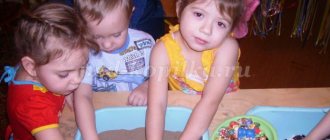The first few years of a baby's life are very important in the development of speech. If a child speaks poorly at 3 years old, then measures should be taken as soon as possible to eliminate this problem.
Parents need to know the signs of speech development delay (SDD), which doctor to contact and how to deal with a silent baby at home.
Causes and signs of delayed speech development
To get rid of ZRR, you need to know the reason for the occurrence of such a problem.
Delayed speech development can be caused by various factors, all of which are divided into four groups:
- biological;
- social;
- pathological;
- psychological.
The first group of causes of RRD includes:
- bad heredity;
- prematurity;
- birth after the 37th week of pregnancy;
- birth injuries;
- low brain activity;
- poor development of oral muscles.
Delayed speech development can be caused by the following pathological conditions:
- meningitis;
- encephalitis;
- severe hypoxia;
- cerebral palsy;
- congenital sensorineural hearing loss;
- Down syndrome;
- intracranial hypertension.
Social reasons for poor speech development in a child:
- communication deficit;
- parents do not conduct training sessions;
- overprotection;
- The baby grows up in a bilingual family.
Psychological factors of ZRR are:
- experienced stress;
- child's isolation.
You can understand that your baby has problems in speech development by the following symptoms:
- insufficiency of humming and babbling in infants, uniformity of sounds;
- lack of pronunciation of sounds and speech at one year of age;
- unsuccessful imitation of adult speech at 1.5 years;
- the child’s inability to pronounce whole words at the age of two;
- the child cannot form simple phrases and sentences at three years old;
- complete lack of speech in a three-year-old child;
- For communication, the child uses gestures and facial expressions to a greater extent.
If parents notice abnormalities in the development of speech in their baby, they urgently need to consult a doctor.
Diagnosis or how to identify the disorder
Diagnosing patients is a rather difficult task. Survey methods include the following:
Questioning a child. If he doesn't speak well, he needs help from a group of doctors. The first task is to exclude organic pathologies. To do this, you need to consult an otolaryngologist. An ENT doctor identifies pathologies of the ears (otitis), nasopharynx and oropharynx (adenoids, tonsillitis). Eliminates hearing loss. If it is impossible to determine the intensity of hearing on site, the child is referred to an audiologist.
The audiologist checks the patency of the auditory tract, uses a special apparatus, and draws a chart. It is easier to work with this data.
The child is then examined by a neurologist. Conducts basic examination, checks reflexes. Prescribes instrumental diagnostic methods. For example:
- duplex scanning of cerebral vessels to assess the intensity of blood flow in cerebral structures;
- if necessary, prescribes ECHO KG, ECG, and also electroencephalography to monitor the work of the heart (it is responsible for feeding the brain), brain activity.
If no organic pathologies are found, they look for mental disorders and problems. Clinical psychologists come into play. A series of tests are carried out, adapted to the child’s age. For perception, representation, speech. Everything that is involved in the speaking process and can be disrupted. In addition to the tests, the specialist talks with the child, finds out how poorly he speaks and what is the reason, and makes recommendations.
As a rule, in the matter of diagnosis one cannot do without a speech therapist-defectologist. His task is to study the speech apparatus. And then correct the violations and teach the patient to speak correctly.
The help of a psychiatrist is also necessary. Its task is to identify possible disorders of higher nervous activity: autism, mental retardation, and other types of dementia. All this is part of the psychiatrist.
If a child speaks poorly at the age of 5, consultation with all specialists will be required. Because complex violations are possible. In system.
Which doctor should I see next? Speech and intellectual impairments occur with endocrine disorders. Therefore, it would not be amiss to consult with an endocrinologist.
Where to contact?
Many parents think that if a child speaks poorly at 3 years old, then they need to contact a speech therapist. But it is worth understanding that doctors of this specialization teach children to repeat various sounds and speak correctly. To get rid of the problem, you need to find out its genesis.
The following types of examinations help determine the cause of RRD:
- Denver test;
- MRI;
- Bayley test;
- ECHO-EG.
After analyzing the examination results, the pediatrician will make a preliminary diagnosis and refer you to a specialist.
The following doctors treat RRD:
- speech therapist;
- defectologist (deals with the speech development of children with physical and mental disabilities);
- neurologist (specializes in eliminating brain pathologies);
- ENT (deals with the treatment of diseases of the hearing organs);
- psychologist (helps develop fine motor skills, improve memory, cope with psychological trauma).
Speech therapists do not make diagnoses. Parents should contact their local pediatrician. The doctor will examine the child’s medical history and refer him for diagnostic procedures.
What to talk about with a 3-4 year old child
At this age, the child’s social circle grows, many children begin to go to kindergarten, which means that on the way to kindergarten or home you can talk about how your day went, what interesting things happened, what made you happy, what you ate for lunch.
Long walks are not only good for health, but also provide excellent opportunities for the development of speech and communication: there is so much new and inspiring around you that you won’t have to look for topics for conversation - you will either answer the questions “what” and “why”, or initiate them yourself conversation. When the baby learns the names of surrounding objects, it is important to continue to expand his vocabulary, answering not only the question “what”, but also the question “what”: not just “grass”, but “dense green grass”. It is useful to speak in extended sentences, complementing what the baby said:
- Dog.
- Yes, what a cute dog runs and wags its fluffy tail!
It will be easier for you to decide what to talk about with a 3-4 year old child if you remember that children are explorers by nature and at this age they study the surrounding reality using all their senses. Name a variety of sensations and encourage your baby to describe his experience: what and how we hear, see, smell, touch, taste.
- Can you hear how loudly this bird chirps?
- What a smooth pebble and what a rough bark of a tree!
It will be great if, thanks to your example and sincere interest in his opinion, the child begins to share his impressions - this will enrich his speech and make him an interesting interlocutor.
For reading, choose books with colorful illustrations, so that the baby has the opportunity to describe them, and you have the opportunity to ask, moving more and more from questions that can be answered briefly and monosyllabically to those that require a detailed answer.
And of course, this is the time when children actively master the language and play with it like blocks or construction sets. They look for patterns in language and in its connection with the surrounding reality. It was during this period that wonderful children's neologisms were born. Many examples can be found in Korney Chukovsky’s book “From Two to Five.” This word creation should be treated kindly, and in no case should you ridicule the child, but correct him correctly, paraphrasing his word or sentence correctly. It's a good idea to record your baby's statements. At an older age, he will happily laugh at them with you.
To help parents, there are a large number of speech games for any age. It is important to remember that the main thing for a child is communication with you, through which he learns along the way. So don't turn games into mandatory, boring lessons. It is best to weave them into everyday activities, then children will not notice that you are doing something on purpose. For example, you can ask: “What are there more on the table: spoons or forks?” (this way you will practice forming the genitive plural forms of nouns) or select an adjective for each noun: the table is wooden, the jam is delicious, the weather is beautiful.
Methods for eliminating SRR
There are different ways to eliminate speech delay in a child. This can be drug therapy, physiotherapy, special exercises, massage. The treatment method is selected based on the cause of the problem identified during the diagnostic process.
If SRD is provoked by socio-pedagogical factors, the creation of a favorable environment is required. Speech pathologists and speech therapists conduct various exercises and use practical and technical means of rehabilitation.
If the cause of RRD is brain dysfunction, then in addition to developmental activities, drug therapy is prescribed. The doctor may recommend giving the baby medications that improve cerebral circulation and stimulate the development of memory and consciousness. Such medications include Actovegin, Cogitum, Nootropil.
Electroreflexotherapy and magnetic therapy are also useful. These procedures affect the areas of the brain that are responsible for speech activity, diction, and mental abilities. If FRA is associated with weakness of the facial muscles, then speech therapy massage will be useful.
It will strengthen the muscles of the mouth and ears. Novikova's probe massage is performed according to individual indications. In some cases, doctors recommend training at the hippodrome or dolphinarium.
What to do at home?
To successfully and promptly solve the problem of delayed speech development, it is not enough just to give medications prescribed by the doctor, take the baby to physiotherapy, classes with a speech therapist or speech pathologist.
Parents need to consolidate at home the skills acquired by the child during the treatment process. There are special training sessions that are conducted in a playful way.
It is necessary to take into account the age of the baby. Children 2-3 and 4-5 years old need to be dealt with differently. Your pediatrician can tell you what to do at home to stimulate speech development.
At 2-3 years
Parents whose children have developmental disabilities are interested in what to do if the child speaks poorly at 3 years old. At home, you need to help your baby develop speech. It is important to exclude those factors that have a negative impact.
Experts give the following advice:
- Do not turn on the TV while the child is awake. Many parents mistakenly think that noise in the background improves speech development. But pediatricians say that children who constantly watch and listen to TV are more likely to experience developmental disorders;
- teach your baby to communicate with gestures. This will help the child get rid of the unpleasant feeling of anxiety and confusion. There are studies that support the connection between speech and sign language;
- put toys and objects of interest to the baby in places inaccessible to him. This will motivate the child to turn to their parents for help;
- Play with your baby at least 40 minutes a day. At this time, you need to use simple expressions (“red ball”, “fast car”);
- conduct training sessions with Doman cards;
- Give your child water, milk, juice, or other liquid to drink through a straw. This will strengthen the muscles of the mouth and make it easier to reproduce words and phrases. It is advisable to use wavy, twisted straws.
At 4-5 years and older
After four years of age, the likelihood of development of mental retardation development into delayed psycho-speech development increases. This is due to the fact that the absence or poor speech inhibits the development of thinking. As statistics show, after 5 years the chances of completely eliminating deviations drop sharply.
In children over 6 years of age, the chance of cure is only 0.2%. Therefore, many parents whose children have developmental disabilities are faced with the question of what to do if a child speaks poorly at 4 years old.
Experts give the following recommendations:
Finger games are useful. It has been proven that the development of hand motor skills improves the functioning of the articulatory apparatus. It is useful for a child to assemble construction sets, puzzles, play with mosaics, sculpt from plasticine, string beads on a fishing line, and paint with finger paints. Outdoor games are also recommended. It is advisable that all actions are accompanied by words. Musical games are useful: guessing the voice of an animal, the names of tunes. This teaches you to concentrate and catch changes in the timbre of your voice. It is necessary to develop visual attention. For this purpose, it is recommended to play with colorful objects and geometric shapes;
conduct developmental classes.- perform a massage . Helps if mental retardation is caused by abnormalities in the psychophysical state.
It is important to remember that working with a child at home is not an alternative to treatment prescribed by a doctor.
Prevention measures
Special prevention is simple:
- You need to talk to your child more. This will help develop perception skills. Then, it is through auditory experience that a person comprehends the subtleties of his own verbal speech and communication.
- You can't distort words. You should communicate in normal, literate language.
- It is worth buying educational toys, be it construction sets, pyramids, logic toys and others.
- It is necessary to promptly treat possible ENT and neurological pathologies.
Read about other speech therapy defects in our articles:
- Dislalia
- Dyslexia
Advice from Dr. Komarovsky
Pediatrician Komarovsky notes that mothers should worry if the child does not speak at three years of age.
According to the doctor, RDD most often occurs due to the fact that parents have little communication with the child and do not conduct training sessions. Komarovsky recommends sending children to kindergarten. In a group, girls and boys learn to speak faster than at home in the company of adults. A well-known pediatrician also gives the following advice:
- examine the baby to find out the reason for his silence;
- perceive the child as a separate, significant person. It is necessary to discuss everyday issues with him (where to go for a walk, what to cook for lunch). Even if the baby does not answer anything, he will begin to form the habit of communicating and his passive vocabulary will be replenished;
- encourage the child’s attempts to pronounce new words, sounds, and imitate adults;
- visit playgrounds more often, invite peers to visit;
- protect your baby from stress.
What to do if your child speaks poorly
Treatment required. The intensity and nature of therapy depend on the specific clinical case and the cause of the disorder. Here are some options:
- removal of adenoids, if a person cannot speak due to their growth;
- complex therapy of sore throat, inflammatory lesions of the pharynx;
- plastic surgery of the speech organs, for example, the frenulum of the tongue;
- correction of hearing loss, as an option - with the help of a hearing aid or internal cochlear apparatus;
- prescribing nootropic drugs and drugs for correcting cerebral blood flow and metabolism in cerebral structures;
- specific therapy for mental disorders, communication with the child, work with a speech therapist - the child should speak as much as possible, it is important to create the right verbal environment for him (adults should pronounce words correctly and interact with the patient as much as possible, placing all responsibility on the doctor is not a good idea, the effect will be much less).
As needed, exercises for the speech apparatus and physiotherapy are prescribed.











